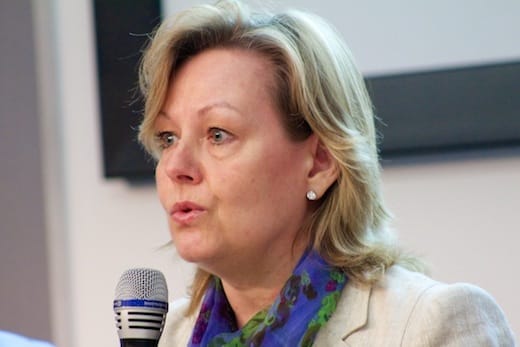Making News Mobile - #newsrw
Live-blogged notes of a panel discussion about making news work on smartphones

A packed and hot room for a panel on the current state of publishing on mobile. Katie King back in the chair.

Kate Milner, mobile product manager, BBC News
Tablets and mobile are changing how people are accessing BBC News content. Traditionally, they’d focussed on the lunchtime peak of desktop. But tablets are bring us huge traffic peaks in the evening, and mobile in the mornings. They’ve been on mobile for two years – 12m app downloads globally. People expect better services from them in apps – but it’s a complicated landscape. Browsers are getting more capable, and the number of devices people are using is growing.
They’re shifting to responsive HTML5 web design – the website automatically adapts to show more content as screen size increases. As the device gets faster, they can offer better quality video. They update the site’s codebase every two weeks. The can customise by capabilities – or can do it by geolocation on mobile devices. They’re working on richer advertising for outside the UK, and continuing to optimise for tablets. They’re working their way up to the desktop, and will completely replace the existing site at some point. They know for sure, thanks to responsive design, that their site will just work on the newly-announced Nexus 7.
They’re not abandoning apps – the marketing opportunity around big events cannot be ignored. They see spikes of downloads around big new events.

Robert Shrimsley, managing editor of FT.com
The story of the FT leaving the Apple app store has been often told. Their fundamental principal is they want to be available everywhere their readers are. They’re not in a hurry to commit to being available through applications like Flipboard or Zite – but hope to do it. It might not be their optimal way of delivering the content, but if it’s what the readers want, they want to deliver it that way fi they can within their business model.
They mine data religiously. They have so many dashboards that it’s staggering. they almost have a data overload situation. There’s an advertising benefit as well, as they target ads. But they can also customise experiences and target stories.
The iPad app has changed the audience’s relationship with the paper – they now treat it as a weekend read, too. So they’re changing what they do to adapt to that. The Daily is failing – he thinks it’s because its form over function. The Week made the mistake of updating daily. Their raison d’être is weekly. And The Economist is a digital representation of the magazine and nothing else. You can learn from all of this. The challenge is to make the product they have give the best experience they can on new platforms. The one core difference is on functionality – you need to make sure it’s up to snuff. Make it easy to share, e-mail and comment.
They see the iPad version as a hybrid. They produce a dynamic version which is up to date with their US rivals. Their newsrooms internationally don’t just own their market – they own their time zone, and can update the content in the app during their “awake” period. Focus on your core purpose and everything else will take care of itself.

Subhajit Banerjee, mobile editor, Guardian
32% of their daily traffic comes through mobile. As so many people have said today, different devices at different times of day. Subhajit was a bit hijacked here – many of his slides had appeared at the business model session this morning, or paralleled earlier in the session.
Interestingly, though, there’s a dramatic swing to mobile at weekends, which has not been discussed before.
Their challenges:
- Best products for different times of the day
- Editing for multiple platforms
- Understanding the user

Peter Bale, vice president and general manager of CNN International Digital, (speaking about Zite)
Peter is here to tell us why Zite is important – and why it’s better than Flipboard. It’s developed by people who worked on Microsoft’s search engine Bing. He’s been drawn into the Zite world step by step, and now he finds himself reading it into the night. He believes curation is a powerful concept – no news organisation can tell all of a story on its own. The move of the web to mobile is a real phenomenon.
Zite is engineered serendipity. If you combine curation with serendipity, you get the element of surprise and discovery. Personalisation can encourage you to go deeper and deeper into your own pathways. Zite answers that. It drowns in social signals, with a credibility rating – and it vets content suppliers for accuracy over time. It models the content from its sources, how much it shares and a semantic analysis. And it models you and your community, learning about you as it goes. It tries to give you what you want – with a cloud of fuzzy logic to give that serendipity. They key to it is the ability to use a thumbs up/thumbs down button to start personalising its recommendations to you.
CNN bought it last year, and as it gets drawn back into the company you’ll see how powerful it can become.





